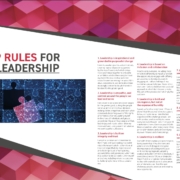Work-Life Balance
When I wrote my book Next Generation Leadership, I interviewed Generation Ys, Generation Xers and Baby Boomers, and I asked them about work-life balance. My first question was, ‘What do you mean when you say work-life balance?’ What was very interesting is that I learned that there’s semantic discord among the generations about their definitions of that term.
For most Gen Xs and Baby Boomers, work-life balance is a ‘when’ question. In other words, when they hear ‘work-life balance’ they would interpret that the speaker wants to work fewer hours, which can lead them to conclude, ‘They don’t want to pay the dues that I paid, and so they’re lazy. So it goes, and that contributes to this incorrect prejudice that Gen Ys are somehow lazy.
When I ask Gen Ys what they mean when they say or hear ‘work-life balance’, they generally say that this is a ‘where’ statement. In other words, technology allows me to work wherever I want. Therefore, what they’re looking for is flexibility in terms of location of work. What they’re rejecting is face-time culture, being chained to your desk, not being able to leave the office until the boss leaves, etc.
Of course, what we learned since Covid is that we should in fact have flexibility in terms of workplace location. And yes, I know that it does vary based on your function or industry whether it is possible to work from home or elsewhere, but nevertheless this is an important semantic discord for us to notice and understand. A great solution is to ask one another before you get into a work-life balance conversation is ‘Well, what do you mean when you say work-life balance in your context,’ to make sure that you aren’t speaking at cross-purposes.
For more from my articles, media, book and speaking, please visit adamkingl.com













